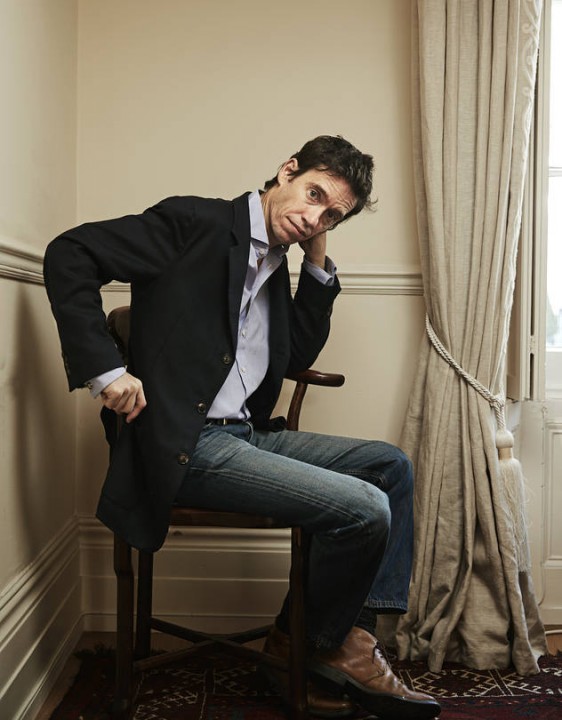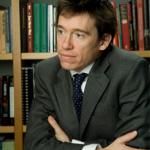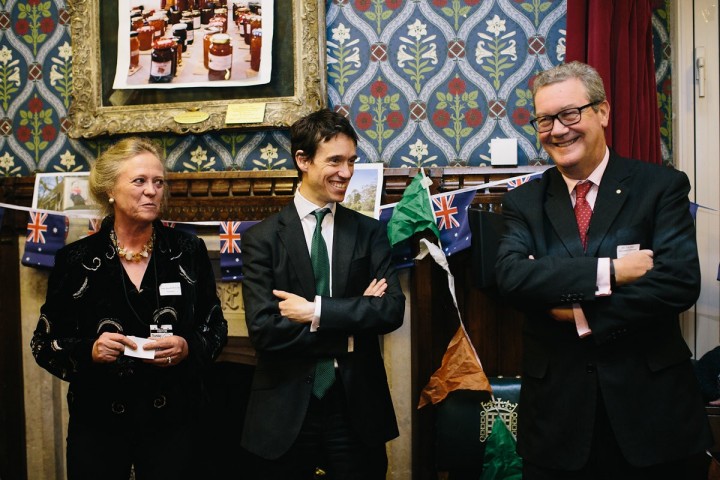
Article first published in the Wall Street Journal by Alexandra Wolfe on 4 November 2016.
In 2011, the British politician and diplomat Rory Stewart decided to walk the 73-mile length of Hadrian’s Wall, the nearly 2,000-year-old structure marking the northwest border of the Roman Empire, with his then 89-year-old father. Mr. Stewart’s goal was to reflect not only on the history of the part of Britain that he calls home but also on the nature of empires and national identity.
“To be honest, I had a lot of very grandiose, slightly pompous ideas about what I could achieve through walking. My father, I think, was more straightforward and just wanted to spend time with his son,” he says. “I suspect he would’ve been just as happy sitting in McDonald’s with me.”
Mr. Stewart, 43, tells the story of their journey in his new book, “The Marches.” The four-day walk didn’t go as planned. Mr. Stewart had hoped that his father, a former diplomat and British secret-service officer originally from Scotland, would accompany him for the first 3 miles of each day and then drive on and meet him later for meals. (The two stayed at inns along the way.) But his father became too weary and just ended up meeting him for breakfast and dinner.
The book details another, longer walk that Mr. Stewart, a Conservative member of Parliament representing part of the northwest English county of Cumbria, took on his own a year later. That one took him 380 miles, from his cottage in his constituency to his father’s home in Scotland. Although his father (whom he affectionately calls Daddy) wasn’t with him, his father was constantly in touch, sending “a continuous stream of 2,000-word emails, reflecting on what I had told him about the landscape and what it suggested about Britain,” Mr. Stewart writes.
That walk was also a good opportunity for Mr. Stewart to meet his constituents. “When you actually dig into people’s personal lives, you find the shepherds that can speak 16th-century Cumbrian turn out also to have motorbiked through Afghanistan,” he says. “The most surprising part was realizing how a society that seems on the surface so traditional is under the surface so incredibly varied and modern…. Every door is a surprise.”
At first, walking such great distances was a struggle. By the end—with his walking stick, a light backpack and two pairs of socks on his feet to prevent blisters—he could cover 36 miles a day.
The trek was far less treacherous than the one he described in his 2004 best-seller, “The Places in Between.” In 2002, he hiked on his own across Afghanistan, including through land held by the Taliban, sleeping on the floor of villagers’ huts along the way. It was part of a larger walk he did in pieces across Asia, from Turkey to Bangladesh.
Mr. Stewart was born in Hong Kong and raised partly in Malaysia, where his father was stationed, and partly in the Scottish highlands. He went to Eton and then graduated from Oxford University. He spent part of one summer tutoring Prince William and Prince Harry at the invitation of Prince Charles.
After graduation he joined the U.K.’s Foreign Office, serving in Indonesia and Montenegro in the 1990s. In the wake of the 2003 invasion of Iraq, he spent a year as deputy governor of two southern Iraqi provinces, Maysan and Dhi Qar, an experience that he recounted in his 2006 book, “The Prince of the Marshes.”
While in Iraq, Mr. Stewart helped to set up health and employment programs for the Coalition Provisional Authority with a monthly budget of $8.5 million. He remembers receiving suitcases of cash to go toward things like health clinics and election infrastructure. But as soon as Britain left the region, he says, the programs fell apart.
Today, as the second-ranking official in the U.K.’s Department for International Development, Mr. Stewart advocates a more targeted approach. In 2006, he and his wife, Shoshana Stewart, worked with Prince Charles and Afghan President Hamid Karzai to set up Turquoise Mountain, a charity that trains artisans and focuses on preserving Afghanistan’s cultural heritage. The organization has since restored more than 112 historic and community buildings in an old neighborhood in Kabul and has trained over 1,000 masons, carpenters and laborers.
That kind of training gives people specific skills that pay off in the longer term, he says. “I wish when I was in Iraq we actually saved the historic bazaar rather than try elaborate, very grand government services in the context of a war.”
In the international arena, Mr. Stewart supports a strong, engaged global presence for the U.S. Still, he sympathizes with President Barack Obama’s resistance to being drawn into Syria. “I saw so clearly in Afghanistan and Iraq the perils of overoptimism,” he says.
Mr. Stewart lives in Cumbria with his wife, who runs Turquoise Mountain, and their 2-year-old son. His father, whom Mr. Stewart calls his “living hero,” died last year. Mr. Stewart says that neither he nor his father, who was proudly Scottish, advocated for Scotland’s independence. “He would feel it was no fun being Scottish if he didn’t have the English to annoy,” he says.
As for future journeys, Mr. Stewart says that he would like eventually to walk from northern Myanmar to southern China and to take a trip on a camel across the Sahara. He also aspires to re-create his long walk through Asia, but going the other direction this time, from Bangladesh to Turkey.
“The challenge is, how do you do that when you have a 2-year-old son?” he asks. He hopes that his son will one day walk with him, just as he did with his father. For now, he says, “Maybe he’ll bicycle alongside me or something. He has incredibly tough little legs.”










 Rory Stewart MP hosted an event in Parliament last week to celebrate the work of the Dalemain Marmalade Awards. At the event, Mr Stewart was joined by His Excellency The Hon. Alexander Downer, the Australian Ambassador, and both spoke of the wonderful energy of the organiser, Jane Hasell McCosh of Dalemain.
Rory Stewart MP hosted an event in Parliament last week to celebrate the work of the Dalemain Marmalade Awards. At the event, Mr Stewart was joined by His Excellency The Hon. Alexander Downer, the Australian Ambassador, and both spoke of the wonderful energy of the organiser, Jane Hasell McCosh of Dalemain.